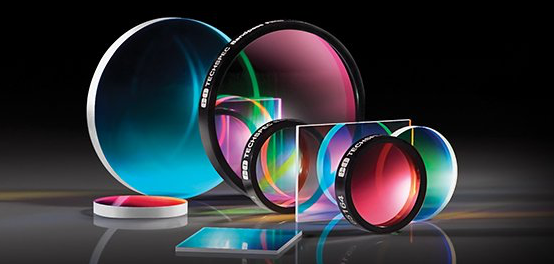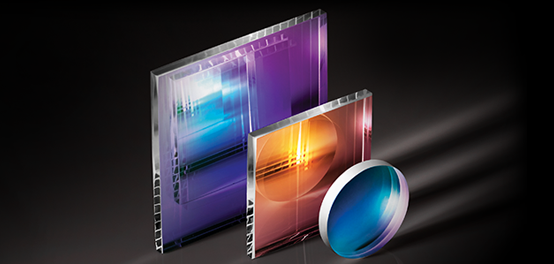蛍光顕微鏡用の蛍光試薬と光学フィルター
本ページはイメージングリソースガイドのセクション9.3です
蛍光顕微鏡は、光の吸収や散乱、反射とは対照的に、蛍光現象を利用した光学顕微鏡の一種です。必然的に蛍光体を使用します。蛍光体は、蛍光顕微鏡検査用にタンパク質や組織、また蛍光標識した細胞に色を付けるために用いる蛍光染料の一種です。蛍光体は、特定波長域のエネルギーを吸収、即ち励起波長を吸収して、別の特定波長域のエネルギーを発光、即ち蛍光波長を発光します。
蛍光顕微鏡システムには、落射型蛍光顕微鏡のようなとてもシンプルな構成ものから、共焦点や多光子システムなどのとても複雑な構成のものまで幅広く存在します。構成がどうであれ、蛍光顕微鏡は同一のコンセプトを共有しています。試料を照明するのに励起エネルギー (励起シグナル)を用い、次に試料が微弱ながらも蛍光エネルギー (蛍光シグナル)を発光し、そのエネルギーを検出する、です。励起シグナルと蛍光シグナルの中心波長は共通ではないため、画像コントラストや信号を高めるのに特別な光学フィルターを必要とします。

Figure 1: 基本的な蛍光顕微鏡セットアップ
最も基本的なコンセプトや図をFigure 1に紹介します。フィルターの編成は、励起用フィルター、ダイクロイックフィルター、蛍光用フィルターのとても特別な3種類のフィルターを用いて構成されます。
Filter #1: Excitation Filter
The excitation filter is placed within the illumination path of a fluorescence microscope and filters out all wavelengths of the light source except for the fluorophore excitation range. The filter minimum transmission dictates the brightness and brilliance of images. A minimum of 40% transmission for any excitation filter is recommended such that the transmission is ideally >85%. The bandwidth of the excitation filter should be entirely within the fluorophore excitation range such that the center wavelength (CWL) of the filter is as close as possible to the peak excitation wavelength of the fluorophore. The excitation filter optical density (OD) dictates the background image darkness; OD is a measure of how well a filter blocks the wavelengths outside of transmission range or bandwidth. A minimum OD of 3.0 is recommended but an OD of 6.0 or greater is ideal.
Filter #2: Dichroic Filter or Beamsplitter
The dichroic filter is placed between the excitation filter and emission filter at a 45° angle and reflects the excitation signal towards the fluorophore while transmitting the emission signal toward the detector. Ideal dichroic filters and beamsplitters have sharp transitions between maximum reflection and maximum transmission, with a >95% reflection for the bandwidth of the excitation filter and a transmission of >90% for the bandwidth of the emission filter. Select the filter with the intersection wavelength (λ) of the fluorophore in mind, to minimize stray-light and a maximize the fluorescent image signal-to-noise ratio.
Filter #3: Emission Filter
The emission filter is placed within the imaging path of the fluorescence microscope and filters out the fluorophore excitation range while transmitting the emission range. The same recommendations for excitation filters hold true for emission filters: minimum transmission, bandwidth, OD, and CWL. An emission filter with the ideal CWL, minimum transmission, and OD combination provides the brightest possible images, with the deepest possible blocking, and ensures the detection of the faintest emission signals.

Figure 2: A generalized fluorophore spectral curve.
Figure 2 shows a typical excitation, emission profile. The absorption and emission profiles share common wavelengths which is one reason why high-quality filters with high transmission, narrow bandwidths, high ODs, and sharp cut-on and cut-off bands are needed. Using low quality filters can ultimately damage the sample, specimen, or expensive sensors. Contact us to help you select the appropriate filters your application.
How Does Edmund Optics Match Filter Pairs?
Edmund Optics offers dozens of in-stock and ready to ship optical filters that fit within the excitation and emission regions of each specified fluorophore. We make it easy to quickly search filters by fluorophore. Simply browse the recommended filters that match the peak excitation or emission wavelength, with maximum transmission at that wavelength. For fluorescence microscopy applications using multiple fluorophores, laser sources, alternate dichroic filters or beamsplitters, or applications more complex than typical fluorescence microscope setups, contact us to discuss your specifications.













 前のセクション
前のセクション 
















もしくは 現地オフィス一覧をご覧ください
クイック見積りツール
商品コードを入力して開始しましょう
Copyright 2023, エドモンド・オプティクス・ジャパン株式会社
[東京オフィス] 〒113-0021 東京都文京区本駒込2-29-24 パシフィックスクエア千石 4F
[秋田工場] 〒012-0801 秋田県湯沢市岩崎字壇ノ上3番地